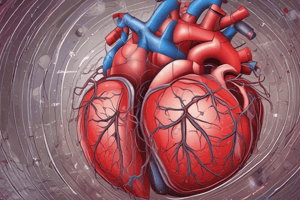Podcast
Questions and Answers
What is the definition of Hypertensive Crisis in terms of blood pressure?
What is the definition of Hypertensive Crisis in terms of blood pressure?
- SBP >180 mmHg and/or DBP >120 mmHg (correct)
- SBP >160 mmHg and/or DBP >100 mmHg
- SBP >140 mmHg and/or DBP >90 mmHg
- SBP >200 mmHg and/or DBP >150 mmHg
Hypertensive emergency requires hospitalization.
Hypertensive emergency requires hospitalization.
True (A)
What are the common causes of Hypertensive Crisis?
What are the common causes of Hypertensive Crisis?
History of HTN; not adherent or undermedicated, cocaine, amphetamines, PCP, LSD
The formula to calculate Mean Arterial Pressure (MAP) is: ________________
The formula to calculate Mean Arterial Pressure (MAP) is: ________________
What is the target Mean Arterial Pressure (MAP) during treatment of Hypertensive Crisis?
What is the target Mean Arterial Pressure (MAP) during treatment of Hypertensive Crisis?
Hypertensive urgency usually requires hospitalization.
Hypertensive urgency usually requires hospitalization.
What are the common medications used to treat Hypertensive Crisis?
What are the common medications used to treat Hypertensive Crisis?
Match the following clinical manifestations with their corresponding symptoms:
Match the following clinical manifestations with their corresponding symptoms:
The mortality rate in one year if Hypertensive Crisis is left untreated is ________________.
The mortality rate in one year if Hypertensive Crisis is left untreated is ________________.
What is the purpose of neurologic checks in patients with Hypertensive Crisis?
What is the purpose of neurologic checks in patients with Hypertensive Crisis?
Flashcards are hidden until you start studying
Study Notes
Hypertensive Crisis
- SBP >180 mmHg and/or DBP >120 mmHg
Hypertensive Emergency
- Requires hospitalization due to target organ damage
- Can result in severe problems if not promptly recognized and treated
- Associated with:
- Encephalopathy
- Intracranial or subarachnoid hemorrhage
- Heart failure (HF)
- Myocardial infarction (MI)
- Renal failure
- Dissecting aortic aneurysm
- Retinopathy
- Untreated, mortality rate is 79% in one year
Hypertensive Urgency
- More common than hypertensive emergency
- No evidence of target organ disease
- Hospitalization usually not required
- Associated with chronic stable disorders:
- Stable angina
- Chronic HF
- Prior MI or CVA
Causes of Hypertensive Crisis
- History of HTN; non-adherence or undermedication
- Use of substances:
- Cocaine
- Amphetamines
- PCP
- LSD
- Leading to seizures, stroke, MI, or encephalopathy
Clinical Manifestations
- Hypertensive encephalopathy:
- Altered mental status
- Headache
- Nausea/vomiting
- Seizures
- Confusion
- Coma
- Retinal changes
- Renal insufficiency
- Cardiac decompensation:
- MI
- HF
- Pulmonary edema
- Chest pain
- Dyspnea
- Aortic dissection:
- Chest and back pain
- Reduced/absent peripheral pulses
Nursing and Interprofessional Care
- Hospitalization for HTN emergency
- Treatment focused on BP and evidence of target organ disease
- IV drugs:
- Slow titration
- MAP 110 to 115 mmHg
- MAP = (SBP +2 DBP) ÷ 3
- Drugs:
- Vasodilators (e.g., sodium nitroprusside)
- Adrenergic inhibitors
- Calcium channel blockers
- Monitoring:
- HR and BP q. 2 to 3 minutes
- Cardiac and renal function
- Neurological checks
- Bed rest for those on IV drugs
- Determine cause of crisis
- Education to avoid future crisis
Hypertensive Urgency: Outpatient Care
- Common oral meds:
- Captopril
- Labetalol
- Clonidine
- Amlodipine
- Require follow-up, often within 24 hours
Studying That Suits You
Use AI to generate personalized quizzes and flashcards to suit your learning preferences.



